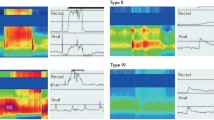Abstract
To assess the efficacy of misoprostol in the treatment of patients with severe chronic constipation, nine such patients were enrolled in a double-blind, randomized, crossover study of misoprostol (1200 µg/day) or placebo, that lasted three weeks. During this period each patient received the drug for one week and placebo for another with a week washout period in between. A colonic transit study, using radiopaque markers, was performed during each of the treatment weeks, while the number of stools and their total weight was recorded by each patient for the appropriate periods. Colonic transit time was significantly and consistently decreased by misoprostal compared to placebo [66 hr±10.2 vs 109.4 hr±8.1 (P=0.0005)]. Misoprostrol significantly increased the total stool weight per week [976.5 g±288.8 vs 434.6 g±190.5 (P=0.001)] and also significantly increased the number of stools per week compared to placebo [6.5±1.3 vs 2.5±0.11 (P=0.01)]. The incidence of abdominal pain was similar in both groups. We concluded that misoprostol, during a short trial period, proved effective in increasing the frequency and weight of bowel movements and decreasing colonic transit time in patients with severe chronic constipation. It may be used as a therapeutic measure to treat such patients.
Similar content being viewed by others
References
Monk JP, Clissold SP: Misoprostol. A preliminary review of its pharmacodynamic and pharmacokinetic properties and therapeutic efficacy in the treatment of peptic ulcer disease. Drugs 33:1–30, 1987
Milton-Thompson GJ, Cummings JH, Newman A, Billings JA, Misiewicz JJ: Colonic and small intestinal response to intravenous prostaglandin F2 and E2 in man. Gut 16:42–46, 1975
Robert A: Antisecretory, antiulcer, cytoprotective and diarrhoegenic properties of prostaglandins.In Advances in Prostaglandin and Thromboxane Research, Vol 2. B Samuelsson, JR Vane (eds). New York, Raven Press, 1976, pp 507–520
Gullikson GW, Pautsch W, Bianchi RG, Monroy M, Bauer R: Comparative effects of misoprostol and 16,16-dimethyl PGE2 on intestinal fluid transport and myoelectric spike activity in the dog. Dig Dis Sci 31:148S, 1986
Bukhave K, Rask-Madsen J: Saturation kinetics applied to in vitro effects of low prostaglandin E2 and F2α concentrations on ion transport across human jejunal mucosa. Gastroenterology 78:32–42, 1980
Staumont G, Fioramonti J, Frexinos J, Bueno L: Oral prostaglandin E analogues induce intestinal migrating motor complexes after a meal in dogs. Evidence for a central mechanism. Gastroenterology 98:888–893, 1990
Soffer EE, Launspach J: Effect of misoprostol on postprandial intestinal motility and orocecal transit time in humans. Dig Dis Sci 38:851–855, 1993
Metcalf AM, Phillips SF, Zinsmeister AR: A simplified assessment of segmental colonic transit. Gastroenterology 92:40–47, 1987
Rask-Madsen J, Bukhave K: Prostaglandins and chronic diarrhea: Clinical aspects. Scand J Gastroenterol 14:73–78, 1979
Bennet A, Sanger GJ: Acid lipids: Prostaglandins.In Mediators and Drugs in Gastrointestinal Motility. G Bertaccini (ed). New York, Springer-Verlag, 1982, pp 219–248
Williams ED, Karim SMM, Sandler M: Prostaglandin secretion by medullary carcinoma of the thyroid. Lancet 1:22–26, 1968
Staumont G, Fioramonti J, Frexinos J, Bueno L: Changes in colonic motility induced by sennosides in dogs: Evidence of a prostaglandin mediation. Gut 29:1180–1187, 1988
Kerlin P, Zinsmeister A, Phillips A: Relationship of motility to flow of intestinal contents in the human small intestine. Gastroenterology 82:701–706, 1982
Sarna SK, Soergel KH, Harig JM, Loo WD, Wood CM, Donahue KM, Ryan RP, Arndorfer RC: Spatial and temporal patterns of human jejunal contractions. Am J Physiol 257:G423-G432, 1989
Misiewicz JJ, Waller SL, Kiley N, Horton EW: Effect of oral prostaglandin E1 on intestinal transit in man. Lancet 1:648–651, 1969
Rutgeerts P, Vantrapper G, Hiele M, Ghoos Y, Onkellin C: Effects on bowel motility of misoprostol administered before and after meals. Aliment Pharmacol Ther 5:533–542, 1991
Rush BD, Rumart MJ: The role of accelerated colonic transit in prostaglandin-induced diarrhea and its inhibition by prostacyclin. Br J Pharmacol 83:157–159, 1984
Burakoff R, Percy WH: Studiesin vivo andin vitro on effects of PGE2 on colonic motility in rabbits. Am J Physiol 262:G23-G29, 1992
Delvaux M, Staumont G, Fioramonti J, Bueno L, Frexinos J: Alterations of colonic motility after oral administration of prostaglandin E1 analogue misoprostol in man. J Gastrointest Motil 4:33–38, 1992
Binder HJ: Pharmacology of laxatives. Annu Rev Pharmacol Toxicol 17:355–367, 1977
Capasso F, Mascolo N, Autore G, Duraccio MR: Effect of indomethacin on aloin and 1.8 dioxianthraquinone-induced production of prostaglandins in rat isolated colon. Prostaglandins 26:557–562, 1983
Lemli J, Lemmens L: Metabolism of sennosides and rhein in the rat. Pharmacol 20(Suppl 1):50–57, 1980
Bennett A, Stanford IF, Stockley HL: Estimation and characterization of prostaglandins in the human upper gastrointestinal tract. Br J Pharmacol 61:579–586, 1977
Moore JG, Alazraki N, Clay GD: Effect of synthetic prostaglandin E1 analog on gastric emptying of meals in man. Dig Dis Sci 31:16–20, 1986
Author information
Authors and Affiliations
Additional information
This study was supported by a grant from Searle, Chicago, Illinois, and presented at the annual meeting of the American Gastroenterological Association, Boston, Massachusetts, 1993.
Rights and permissions
About this article
Cite this article
Soffer, E.E., Metcalf, A. & Launspach, J. Misoprostol is effective treatment for patients with severe chronic constipation. Digest Dis Sci 39, 929–933 (1994). https://doi.org/10.1007/BF02087539
Received:
Accepted:
Issue Date:
DOI: https://doi.org/10.1007/BF02087539




